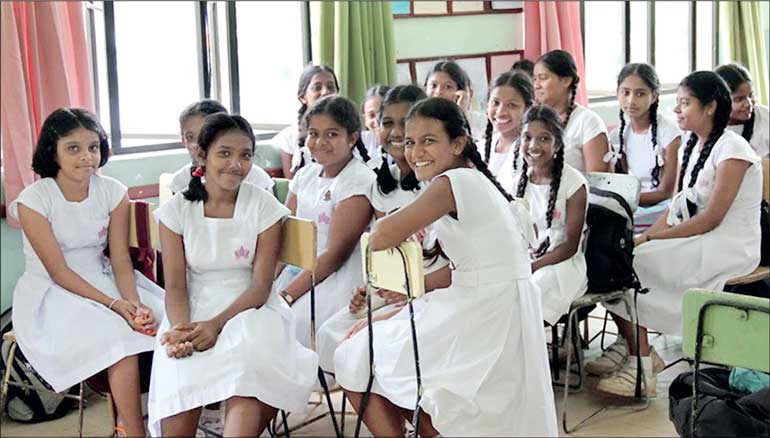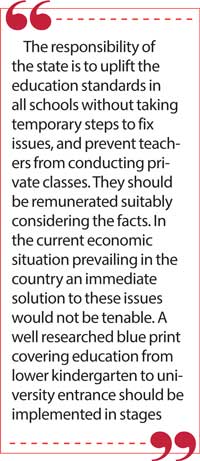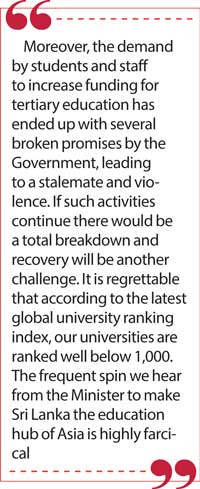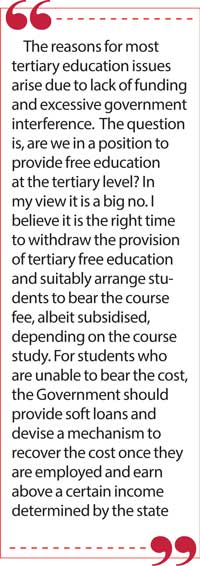Wednesday Feb 18, 2026
Wednesday Feb 18, 2026
Wednesday, 1 November 2023 00:30 - - {{hitsCtrl.values.hits}}

 Many sectors in the country today need urgent attention and reforms by the Government. This article primarily focuses on the sustainability of free education in the current form, a notion now outdated, but at the same time not intended to deprive anyone of tertiary education. Tertiary is not to limit admission to state universities, but to enter technical colleges to further one’s employability locally or internationally.
Many sectors in the country today need urgent attention and reforms by the Government. This article primarily focuses on the sustainability of free education in the current form, a notion now outdated, but at the same time not intended to deprive anyone of tertiary education. Tertiary is not to limit admission to state universities, but to enter technical colleges to further one’s employability locally or internationally.
Managing the extraneous forces that attack the core ideology of free education is a significant challenge for governments and needs the formulation of effective policies, to progressively fund the primary and secondary education sector, ensuring that every child has equitable access to education, and reducing the disparity between urban and rural schools. As Sri Lanka is a Socialist Republic, any child irrespective of the demography, should not be deprived of the facilities enjoyed by city or urban students.
Meaningful, effective reforms needed
The Tertiary education system worldwide has transformed dramatically over the past decades, although in Sri Lanka the adaptation to those changes have been slow and resistive, partly due to the hard-core notion embedded in society of free education which has prevailed over many years. Therefore, meaningful and effective reforms are an urgent necessity to compete internationally and also maintain especially the tertiary education world rankings. Does the free education system in Sri Lanka prohibit the freedom to obtain tertiary education?
Reforms are required in the short term and the long term in not permitting institutions with international affiliations to mushroom, offering substandard degrees even at doctorate levels. Proper funding arrangements are needed to uplift the standards of the local tertiary providers, to be productive and compete in the internal and international spheres.
Governments over the years have not made any attempt to reform this sector as it is politically sensitive but have given band-aid solutions, disguising the real agenda under the “socialist framework”.
Free education is not only providing education free of charge but providing equitable access to every child irrespective of demography, exploiting individual strengths and cultivating good values to become law-abiding citizens.
Primary and Secondary education sector
 The so called “real” free education had collapsed many years ago. Sri Lanka liberalised its education policy, allowing private international schools to operate and grow prolifically driven by the demand of parents unsatisfied in the public education system.
The so called “real” free education had collapsed many years ago. Sri Lanka liberalised its education policy, allowing private international schools to operate and grow prolifically driven by the demand of parents unsatisfied in the public education system.
The Government has failed to create an effective regulatory framework in a timely manner, thus leaving room to add another layer to the existing “well known” hierarchical schooling system.
The absence of such national regulatory framework is regrettable and dilutes the impetus for education. Another driver for the growth of these institutions is the medium of delivery, English. Sri Lanka should learn from developed countries on how to run a mixture of schools in a competitive and liberalised environment without losing its core emphasis and improve the overall development of the next generation.
Furthermore, signs of decline in the education system were noticed much earlier, and therefore most parents resort to send their children to private afterschool tutories in order to be competitive at public examinations.
Private tutories
There has seen an upsurge in private afterschool tutories and institutions in the recent past. Private tuition is a huge industry spread countrywide and run mainly for profits. Nearly 50 years ago only Colombo students had access to such coaching, but now in every corner of the country you find posters and cut-outs advertising tuition classes and the credentials of the tutors.
In the backdrop of the teachers’ continued negligence of their primary responsibility, this industry has expanded from a niche to a wider market over the decades.
The Government has neither control nor regulatory powers to reform this market but often criticise it as an unhealthy environment for the child’s overall development. It is therefore, the responsibility of parents to fathom the quality of teaching before they resort to private coaching targeting competitive results at examinations. The natural competition among them will self-regulate the demand and quality of teaching.
The teachers at these tutories are mostly university graduates and cater to the demography they operate, in terms of fees and quality. It is a fact that without external coaching it is hard to achieve top ranks at examinations. Recently, listening to the comments of top A/L achievers showed that they are fully committed to studies and it was a monotonous exercise revising notes and working on past questions.
In a session with the President and the Prime Minister at the Presidential Secretariat, one of the top achievers from the North said the questions in the A/L examination papers need to be innovative and not stereo-type.
Top achievers when they visit schools do not say they have attended private classes but give full credit to the schools.
This is a totally false pretence. The responsibility of the state is to uplift the education standards in all schools without taking temporary steps to fix issues, and prevent teachers from conducting private classes. They should be remunerated suitably considering the facts.
In the current economic situation prevailing in the country an immediate solution to these issues would not be tenable. A well researched blue print covering education from lower kindergarten to university entrance should be implemented in stages.
Tertiary education sector
 Since the 1970s the university education sector was subject to various upheavals, including many stoppages due to the JVP insurrection and several industrial actions by the students and staff.
Since the 1970s the university education sector was subject to various upheavals, including many stoppages due to the JVP insurrection and several industrial actions by the students and staff.
These unwarranted stoppages have placed tertiary education to fall behind several years. Even at present university undergraduates are seen protesting for their rights.
Moreover, the demand by students and staff to increase funding for tertiary education has ended up with several broken promises by the Government, leading to a stalemate and violence. If such activities continue there would be a total breakdown and recovery will be another challenge.
It is regrettable that according to the latest global university ranking index, our universities are ranked well below 1,000.
The frequent spin we hear from the Minister to make Sri Lanka the education hub of Asia is highly farcical. Without increasing funding there is no guarantee that Sri Lanka will become the tertiary education hub.
The reasons for most tertiary education issues arise due to lack of funding and excessive government interference.
The question is, are we in a position to provide free education at the tertiary level? In my view it is a big no. I believe it is the right time to withdraw the provision of tertiary free education and suitably arrange students to bear the course fee, albeit subsidised, depending on the course study. For students who are unable to bear the cost, the Government should provide soft loans and devise a mechanism to recover the cost once they are employed and earn above a certain income determined by the state. Also, the Government should allow universities to operate as autonomous entities, holding only the regulatory function. Government interference and getting involved in the day to day conduct of the business is most inefficient. Creating such autonomous entities similar to the models in most fast developing and developed countries encourage competition among universities making them productive, efficient and competitive. The authorities should understand that without healthy competition university rankings cannot be improved.
Local private institutions affiliated to foreign universities
Acquiring degrees offered by affiliated foreign universities in Sri Lanka is considered as a status symbol and has the advantage of winning employment as opposed to state universities. Students from affluent local and international schools could easily get admission to those universities leveraging the English medium of education and fluency in the English language. This is a grave concern and needs the urgent attention of the Government to re-address this anomaly without allowing the market forces to dominate. A majority of those universities have low international rankings, and none of them are listed in the Academic Ranking of World Universities.
Although education has now become a business, none should be deprived of admission to either local or foreign universities operated in Sri Lanka.
The following will bring several social and economic benefits:
Re-design university courses and their curriculum to attract students for courses with good employment prospects upon completion of the degree. Needs industry participation, and negotiation with industries to fund for specific research projects relevant to Sri Lanka
 Traction to invest in creating jobs rather than fattening the public service and adding layers of bureaucracy which has proved unproductive
Traction to invest in creating jobs rather than fattening the public service and adding layers of bureaucracy which has proved unproductive
Discourage industrial actions that result lengthening the course duration- this would drive students to complete the course and get employed without delay
Terminate courses that are not in demand – this will reduce the academic staff, thereby reducing the burden on the Government
Recover course fees from employed graduates – the Government will then be in a position to increase funding for universities creating pathways for improvements and recognition Couple the salary increases of lecturers and other non-academic staff with performance Device mechanisms to conduct performance reviews of all academic and non-academic staff coupled with rewards and recognition with feedback from students.
Increase funding for research, demanding lecturers to get involved and publish and present papers locally and internationally with monetary rewards
Rank universities within Sri Lanka and encourage competition.
Conclusion
In the recent past, the Government has visualised on establishing educational and IT hubs particularly to serve the Asian region thus mutually benefitting.
However, considering our immediate neighbour India, well ahead of technology and education, breaking into this market would be a monumental task for Sri Lanka. Hence, at least Sri Lanka should redesign to operate as a spoke of Indian hubs.
The Government should realise that reforms are urgently needed in the educational sector, not on an ad-hoc basis by the incumbent Minister or the Cabinet but to harness the full potential of the capabilities of the younger generation.
In the 60s and 70s, getting all “A”s in the subjects at the O/L and A/L exams were unimaginable. In this day and age if a student could not get “A” s it is considered low. Although Sri Lanka has produced high intellects through strict admission to state universities they have not helped to uplift the country with the acquired knowledge and skills. Universities have become factories of producing graduates, unproductive at the end and a huge burden on the state.
As pointed out by the top-ranking student, the exams are stereo type and the questions not innovative, therefore, the education system and framing of questions have to be reformed and redesigned in such a manner as to produce top all-round academicians for the country.
Reference
https://www.colombotelegraph.com/index.php/on-sri-lankas-free-education-crisis/